'During his stint as prime minister, he got 270 million people out of poverty.'
'This, according to the World Bank, is the fastest compression of poverty anywhere in the world.'
Arvind Mayaram, the former finance secretary, recalls his encounters with Dr Manmohan Singh.

Dr Manmohan Singh held charge of the Union finance ministry when I was appointed Economic Affairs Secretary in 2012.
He had selected me for the post, but when I joined, charge of the finance ministry was given to P Chidambaram.
(In April 2014, Mayaram was appointed finance secretary.)
I found him to be a prime minister who had an immense capacity to listen.
Take the Union Budget of 2013. It was a very difficult situation given the way the economy had tanked then.
If you recall, GDP growth in 2012-2013 had gone down to 5.1 per cent after growing consistently for 8 per cent till 2011.
There were other issues too -- the fiscal deficit was high and there was a risk of downgrading our credit rating.
The rupee had gone from Rs 59 to Rs 68 per dollar. Such were the times when I joined the finance ministry.
At that point of time, whenever we went to Dr Singh, I always found him a very patient listener.
I never saw him being impatient. I never heard him saying, 'Why are you saying this?'
I already knew that being a renowned economist and former finance minister, he must have considered many of those things himself.
When we spoke, he listened very carefully. Even if someone's argument was contrary to his, he never expressed resentment.
He always used to say, 'I think you have a point of view but this may be a better point of view'. He was persuasive.
Dr Singh brought a lot of confidence into the room at a time when different type of crises were blowing up one after the other.
He had a very steady hand and even during a big storm, we never felt that we were without direction.
He was not whimsical; he thought through things and gave directions. His directions were never a diktat or a command.
They were always framed like suggestions and those suggestions in a form that became an order.
The entire middle class today, which is 400 million in number, we can claim, is Dr Manmohan Singh's making.
Before 1990, we had a very small middle class in India and growth was very slow. People remained in poverty for very long.
During his stint as prime minister (2004-2014), he got 270 million (27 crore) people out of poverty.
This, according to the World Bank, is the fastest compression of poverty anywhere in the world.
We keep talking of (his achievement as finance minister) 1990 to 1995 during the liberalisation period, but what happened between 2004 and 2014 during his tenure as PM was even more dramatic.
This was the second revolution as he brought 27 crore people out of poverty (2004 to 2014).
The coming out of 27 crore people so quickly became a crisis of expectation for his government.
Once, you are out of poverty you want more, and quickly.
And this period for consolidation was not available to him.
But the fact that so many people came out of poverty is historical.
MNREGA (Mahatma Gandhi National Rural Employment Guarantee Act) was one of the schemes that helped to lift people out of poverty, but at the same time the economy was growing at 8 per cent per annum till 2010-2011.
This was the fastest ever growth of the Indian economy.
There was rapid growth and jobs were being created.
What MNREGA did was that it was not providing jobs but it gave a bench mark for the semi and unskilled rural poor to be able to get better wages.
This happened in sectors even outside agriculture, like the construction industry.
This was also the reason for inflation because the demand side got a major push but the supply side needed time to catch up.
Time was not given to him because of fictitious scams like 2G and the CAG report, which pulled numbers out of the hat that the media played up.
The government then had no time to consolidate. They did not have bandwidth to consolidate the gains of a demand side push.
There was a huge growing demand but the supply side was not catching up.
If he had got another five years, we would have seen that consolidation.
Today, we are in imminent danger of a middle income trap.
Now, the whole economy is designed in a manner where monopolies are growing and predicated for only 300 to 400 million people.
All the production and services are happening for them. Gig services, tourism, entertainment or hospitality is for these 300 to 400 million people leaving out the other 800 million faceless people.
History, he said, will remember him kindly. I say history will remember him with a lot of gratitude.
His critics and opponents called him a 'puppet prime minister' but you got to understand he was not a muscular prime minister.
What the late John F Kennedy said describes Dr Singh perfectly. 'Civility,' Kennedy said, 'is not a sign of weakness.'
In India, unfortunately, we mistake civility to be a sign of weakness.
Arvind Mayaram spoke to Syed Firdaus Ashraf/Rediff.com.
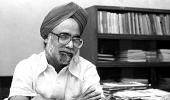
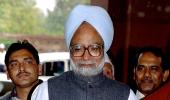
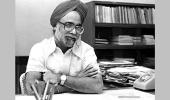
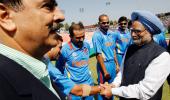
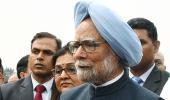






 © 2025
© 2025